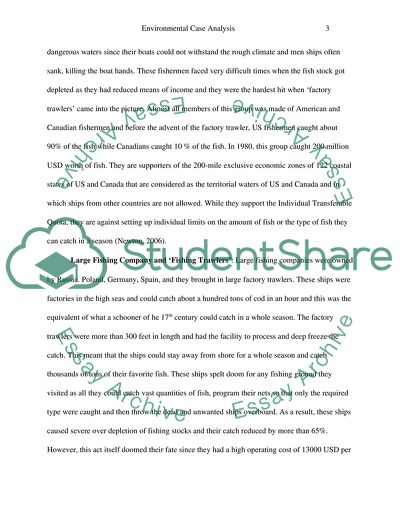
- Home
- Free Samples
- Premium Essays
- Editing Services
- Extra Tools
- Essay Writing Help
- About Us
- Studentshare
- Subjects
- Miscellaneous
- Environmental Case Analysis
Environmental Case Analysis - Essay Example

- Subject: Miscellaneous
- Type: Essay
- Level: Masters
- Pages: 4 (1000 words)
- Downloads: 0
- Author: crawford58
Extract of sample "Environmental Case Analysis"
nted out that over fishing in the region has severely depleted the fishing stock and upset the food chain and the whole ecosystem is now under threat. This paper identifies the stakeholders and the various perspectives, concerns, interest, and pressures each bring to the situation. The paper further examines the relationship between environmental science and ethics as they relate to the various stakeholders’ interests. Small fishermen: These are small time fishermen who operate small fishing boats and all fishing is done manually.
The catch is often carried in the ships hold to the shore where it is processed. These fishermen caught fish in limited quantities and allowed the fish stock to recover. They had lesser operating costs and managed to sustain themselves and the fishing communities in which they lived. The small fishermen could not venture into deeper or more dangerous waters since their boats could not withstand the rough climate and men ships often sank, killing the boat hands. These fishermen faced very difficult times when the fish stock got depleted as they had reduced means of income and they were the hardest hit when ‘factory trawlers’ came into the picture.
Almost all members of this group was made of American and Canadian fishermen and before the advent of the factory trawler, US fishermen caught about 90% of the fish while Canadians caught 10 % of the fish. In 1980, this group caught 200 million USD worth of fish. They are supporters of the 200-mile exclusive economic zones of 122 coastal states of US and Canada that are considered as the territorial waters of US and Canada and in which ships from other countries are not allowed. While they support the Individual Transferable Quota, they are against setting up individual limits on the amount of fish or the type of fish they can catch in a season (Newton, 2006).
Large Fishing Company and ‘Fishing Trawlers’: Large fishing companies were owned by Russia. Poland, Germany, Spain, and they
...Download file to see next pages Read MoreCHECK THESE SAMPLES OF Environmental Case Analysis
Mega Food Store Business Case and Environment Analysis
Political Environment Case Study Analysis
Macro & Micro Environmental Analysis
Conducting an Environmental Analysis: Jims Care Center
Market-Based Environmental Policy
Strategic Environmental Analysis Systems
The Chain of Causation and Discipline Analysis
Ways of Looking Waste

- TERMS & CONDITIONS
- PRIVACY POLICY
- COOKIES POLICY